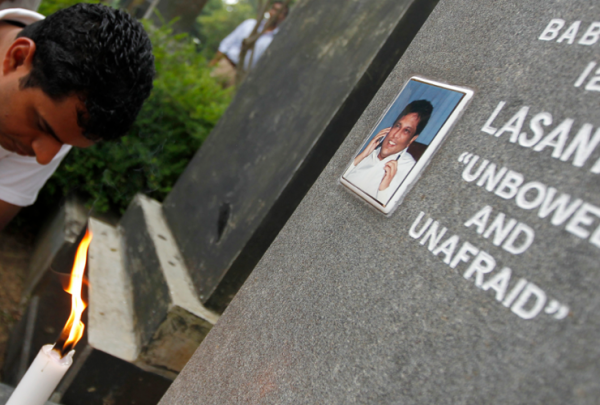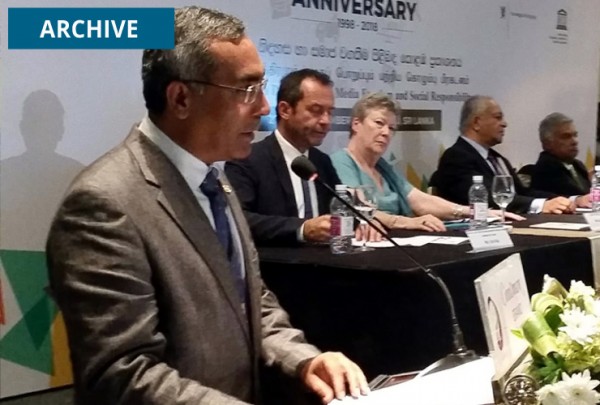One year after the murder of former Sunday Leader editor Lasantha Wickrematunge, one of Sri Lanka’s most persistent and authoritative critics of both the government and the militant Tamil Tigers (LTTE), none of the perpetrators has yet been brought to justice.
“It is one year and no break-through has been made,” Lasantha’s brother and current Chairman of Leader Publications Ltd. (which includes the Sunday Leader), Lal Wickrematunge, told IPI today. “The case in court has been called 24 times and postponed; and police have not made any headway into solving the crime.”
Lasantha Wickrematunge was shot near the Sri Lankan capital Colombo by unidentified gunmen riding on a motorcycle on the morning of 8 January 2009 as he was driving his car to his office. He died of his wounds a few hours later.
Throughout 2009, and despite an end to the decades-long conflict between the Sri Lankan government and the LTTE, no real progress has been made in ensuring journalists’ right to report independently without fear of retaliation.
“The threats that were there during the time of the war have now been turned for political games,” Lal Wickrematunge said. “We don’t feel safe at all.”
Lal Wickrematunge said that under Sri Lanka’s current government 14 journalists have been murdered, more than 20 journalists have been abducted or assaulted, and many others have left the country.
None of those responsible for the murders and assaults have yet been brought to justice.
Two journalists were killed in Sri Lanka in 2009, others were attacked and a shocking 20-year prison sentence was handed down in August to J. S. Tissainayagam, editor of the North Eastern Monthly and a columnist for the Sunday Times in Colombo, under anti-terror legislation, for criticizing the Sri Lankan government’s assault on the Tamil Tiger rebels, and the civilian suffering it caused.
A November 2009 press freedom mission to Sri Lanka, jointly conducted by the International Federation of Journalists (IFJ), International Media Support (IMS), and IPI found that journalists in Sri Lanka continue to operate in a climate of fear.
IPI Press Freedom Manager Anthony Mills, who took part in the mission, noted: “During our visit to Sri Lanka, we were told by officials that the Sri Lankan government respects press freedom. But words are not enough. There must be immediate action to tackle the culture of impunity behind which the killers of journalists hide, to allow journalists unhindered access to all parts of the country, and to ensure that they are free to practise their professions without fear of murder, assault, harassment, arbitrary arrest or imprisonment. The absence of any real progress towards bringing Lasantha’s killers to justice is just another reminder of the unacceptable press freedom situation in Sri Lanka.”
IPI’s Justice Denied Campaign highlights the problem of impunity in Sri Lanka in its call for justice for slain photojournalist Subramaniyam Sukirtharajan, who was killed in 2006 soon after Sudar Oli, a popular Tamil-language daily for which he worked, published his photographs of five murdered Tamil high school students. The photographer’s killers remain at large.
Staff members at Sudar Oli have repeatedly been targeted because of the paper’s allegedly pro-Tamil stance. Sudar Oli editor Nadesapillai Vithyatharan was detained on 26 February 2009 under anti-terrorism laws, and accused of having links with Tamil Tiger rebels. He was released for lack of evidence on 24 April.


